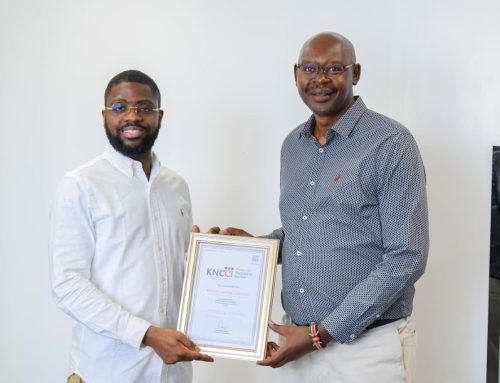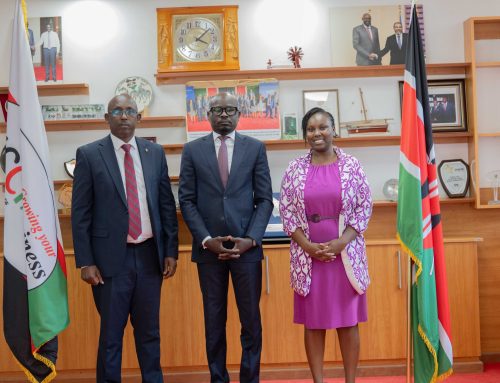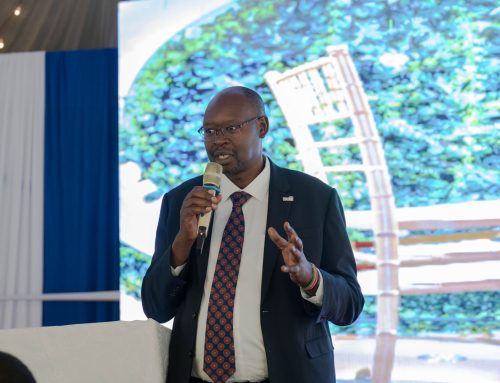
The Kenya National Chamber of Commerce and Industry (KNCCI) today hosted the European–Kenya Business Networks Dialogue on Responsible Business Conduct (RBC) at Maa Hotel & Suites, Nairobi. The high-level forum brought together government officials, European Union representatives, development partners, business leaders, and private sector networks to advance conversations on ethical, sustainable, and competitive trade between Kenya and the European Union.
The dialogue was graced by the partners in the project including the State Department for Trade, officials from the European Union Delegation, representatives from the Embassy of Sweden and SIDA, the Danish Institute for Human Rights (DIHR), and leaders from Kenya’s private sector.
Speaking at the event Dirk Hoffmann, Chief Advisor, Danish Institute for Human Rights (DIHR) asked Kenyan companies to familiarize themselves with global developments with multiple countries currently developing their own legislative approaches to making human rights due diligence mandatory. He described the recent European Partnership Agreement deal which the European Union has termed the most ambitious new deal in terms o sustainability and human rights a hint of where future agreements will look like.
“As part of global value chains African businesses may face increasing requirements to demonstrate how they manage and communicate about human issues. We are happy that the Kenya National Action Plan includes a commitment to make human rights due diligence a mandatory part of licensing process through a revision of the company Act”

Representing the Ministry of Trade and Investment Director for Trade Simon Chelelgo said the government has enhanced engagement with firms especially those in the agricultural sector to ensure they abide with the new rules. He said the government is leading the way in compliance with the formulation of regulation and policies and the review of the Company Act is underway.
In his address, KNCCI President Dr. Erick Rutto emphasized that responsible business conduct has become a global trade imperative. KNCCI highlighted that Kenya exports goods worth KSh 190 billion annually to the European Union, predominantly in coffee, tea, horticulture, and manufacturing hence with new developments such as the EU Green Deal and the Corporate Sustainability Due Diligence Directive (CSDDD), exporters must strengthen sustainability, traceability, and human rights standards to retain and grow market access.
Dr. Rutto also noted that competitiveness and sustainability are now inseparable, as 7 in 10 European consumers prefer ethically sourced products.
“Responsible Business Conduct is no longer a moral choice; it is a global requirement and a strategic necessity,” said Dr. Rutto. “With the EU shaping over €4 trillion in global trade through sustainability regulations, Kenyan businesses must integrate sustainability and human rights into their operations to remain globally competitive.”
Representing 47 county chambers and over 50,000 enterprises, KNCCI outlined ongoing efforts to embed responsible business principles across Kenya’s private sector. Through the pioneering Business and Human Rights (BHR) Programme, implemented with DIHR and funded by SIDA, KNCCI has:
- Trained 800+ enterprises on sustainability and due diligence.
- Conducted a Sector-Wide Impact Assessment (SWIA) for the coffee industry in 10 counties.
- Supported MSMEs to adopt responsible sourcing and traceability systems.
“These efforts not only empower our MSMEs but reinforce Kenya’s reputation as a reliable and responsible trade partner globally. Let us build a private sector that is globally competitive, ethically grounded, and sustainably driven. Together, we will ensure Kenya’s exports lead globally with integrity, innovation, and impact,” Dr. Rutto added.
The morning sessions featured expert insights on European legislative developments and their implications for international trade. Discussions explored the EU–Kenya Partnership Agreement, sustainability compliance, and practical models of corporate human rights due diligence.

While speaking on the recently signed Economic Partnership Agreement between Kenya and the European Union Filipo Amato said the new agreement stands out as the only such EPA with an African country where sustainable development takes center stage.
“The Economic Partnership Agreement between Kenya and the European Union is the most ambitious new deal in terms of sustainability and human rights.”
The forum also highlighted the importance of collaboration in navigating emerging global sustainability frameworks with the partners including:
- DIHR,
- EU Delegation, Embassy of Sweden, SIDA,
- UN Global Compact Network Kenya, and
- Leading private sector networks.
Collectively, these stakeholders are supporting businesses to understand EU requirements, adopt RBC practices, and explore new sustainable market opportunities.
In closing, investors were urged to embrace responsible, ethical, and sustainable business as the foundation of long-term trade growth.






Leave A Comment